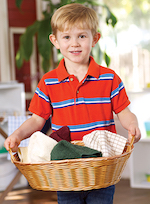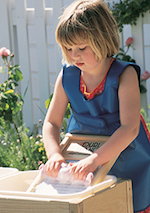
 Whether leaving home for a day at pre-school or for a week at summer camp, children can learn how to get themselves ready. Knowing how to perform the tasks of daily living is essential for children to become responsible and independent. As your child grows, your life as a parent will become easier and easier if you refrain from doing too much of what children can do for themselves.
Whether leaving home for a day at pre-school or for a week at summer camp, children can learn how to get themselves ready. Knowing how to perform the tasks of daily living is essential for children to become responsible and independent. As your child grows, your life as a parent will become easier and easier if you refrain from doing too much of what children can do for themselves.
My grandson recently went off to college. Though he was ready to discover the world, and is smart, capable and responsible, there was one thing he had never done: his laundry! Yes, when he was barely walking, he learned to put his dirty clothes in the hamper. By age six, he found out that if his clothes were not in the hamper, they would not be washed. After having to sit out a soccer game because he was wearing the wrong jersey, my grandson learned to give his mom advance notice if he needed something washed on a particular day. These were helpful lessons he learned about laundry, but he had never actually been taught how to use the washing machine. Of course, he did learn how to wash his clothes before he left.
Parents can be successful at teaching their children to be independent, within the parameters of what's appropriate for a child's age and abilities. Most parents struggle to not take over for their child—showing up at school with a forgotten lunch, or making a special trip to deliver the uniform to the game. These rescues prevent a child from experiencing natural consequences.
Still, it's important to find a comfortable and workable balance. Depending on the situation and age of your child, you may decide to first "rescue and warn" a few times. However, once your child is truly able, let the natural consequences happen. Many children actually feel proud when they have figured out their own solutions, and will be quick to tell you how they asked a friend to share food or borrowed money from the teacher to buy lunch.
We've all heard the term "helicopter parent." I define this as parents doing for a child what he is perfectly capable of doing for himself, and often stepping in to correct or speak for a child. Wikipedia says that a helicopter parent is "a parent who pays extremely close attention to a child's experiences and problems... . Helicopter parents are so named because, like helicopters, they 'hover overhead,' overseeing every aspect of their child's life constantly." It's difficult for a child to become self-reliant in such a situation.
 My grandson had no difficulty packing for college and knew what clothing, personal items and things he needed for school and sports. How did that happen? At a young age, he learned to pack his backpack for school. Initially his mom or dad helped him by talking with him about what he would need while they showed him how to stow each item. When he could do this by himself, his parents would check that nothing was forgotten. Then, at around age three, they only needed to verbally check in with him about the contents. By age four, he was loading the backpack himself without help or reminders.
My grandson had no difficulty packing for college and knew what clothing, personal items and things he needed for school and sports. How did that happen? At a young age, he learned to pack his backpack for school. Initially his mom or dad helped him by talking with him about what he would need while they showed him how to stow each item. When he could do this by himself, his parents would check that nothing was forgotten. Then, at around age three, they only needed to verbally check in with him about the contents. By age four, he was loading the backpack himself without help or reminders.
Allowing a child to pack for school takes a bit of organization and planning. Parents set the routine and play a significant part in making the household function. For example, they might prepare their child's lunch and have it ready for him to retrieve from the kitchen counter. Finding a consistent place for everything makes locating jackets, coats, uniforms, homework and sports equipment far easier. This is what Maria Montessori called a "prepared environment." One parent I know posts the weather forecast on the kitchen blackboard daily so everyone can bring whatever the weather requires. She said this keeps her from nagging.
In addition to packing for school, my grandson learned to pack for trips away from home—from his first overnight with a friend, to family vacations and camp. Children who have packed their own suitcases take pride in caring for themselves. Again, depending on a child's age, parents can anticipate needs and show how to pack a duffle or suitcase. It's really a joint project, because your child is not left alone to figure it out, but is supported in learning new skills.
No matter how you teach children to be independent, keep your cool. We all have bad days, and if your child appears to be terribly anxious or on the verge of a "melt-down, " step in and help find the lost shoe or homework. Don't give your child more responsibility than he can handle—consider his age and temperament and most importantly, what works best for both of you. Children will give you signals if something needs to be changed or re-considered.
Getting ready to leave is often a group effort, whether for a day at work, school, or for the next life adventure. With thoughtful planning and practice, we can all be prepared and ready to go.
—by Jane M. Jacobs, M.A., Montessori Educational Consultant at Montessori Services. She is a trained primary Montessori directress and also a Licensed Marriage and Family Therapist. She has taught children aged 2 to 7 years in Montessori schools, Headstart, and also in a preschool for children with developmental challenges. In her counseling practice, she helps individuals, couples, and families.
—Originally Published 2019